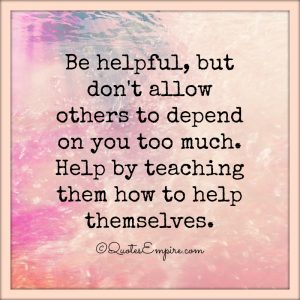 Most of us like to help others. It’s practically useful, solves problems and usually makes us feel good about ourselves.
Most of us like to help others. It’s practically useful, solves problems and usually makes us feel good about ourselves.
Yet help isn’t always beneficial. Consider…
Sometimes poor assistance or advice is rendered that either exacerbates problems or even creates issues.
And perhaps too much help is proffered.
How might there be too much assistance?
Maybe the support is overkill; a little guidance or direction is all that’s required, and the beneficiary wants nothing more.
In some cases, the old adage fits well: “Give someone a fish and you provide a meal, teach them to fish and they can feed themselves for life.”
Guiding and assisting is often all that’s needed. This can sometimes be counter to the emotional needs of providers who often want to show off their skills and be seen to solve problems; often they need to control, too.
If someone is self-sufficient then guidance and direction is usually all that is wanted. However, should they be in some way actually incapacitated then (diplomatically) completing the job for them can indeed be appropriate.
Intervening too much means exercising unnecessary and unwanted control that inhibits an individual’s independence while diminishing their sense of self-reliance.
So, can we offer help and consequentially do more harm than good? Yes indeed.
Imagine a young child needing to develop specific skills, self-sufficiency and confidence. It seems they would often be candidates for the guidance and direction approach in non-urgent, less serious situations where their long-term development can benefit.
Correspondingly, a Doctor would normally provide a comprehensive fix to patients; a specific and complete solution is typically required. Perhaps this is complemented with longer-term maintenance instruction and guidance.
Diverse types of problems require different levels and methods of assistance. And this affected further by the make-up and skills of the recipient and provider, circumstance and timing.
Consider next the highly analogous area of mental health…
Every human has a unique, distinct personality and psyche.
Individuals are created and/or defined by their DNA, experiences, culture and position. Normally their outward behavior is affected and determined by any combination of these elements.
So typically, they can sometimes have problems as a result. These may be minor, or significant and prominent displays, subject to situational stimulus… some things bring out the worst in people.
And these problems attract helpers.
So what type of help should be rendered? Is this a case of providing a fish or offering a lesson in the art of fishing?
The same basic principles apply.
Teaching awareness and guidance is a great first step. Independent and self-aware individuals might hopefully thrive from just this.
It is only the truly impaired that require more profound and continuous support.
And here is the mental health dilemma…
When is enough, enough? Are we sometimes in danger of overkill with excessive or protracted help; perhaps creating needless dependencies and providing crutches when we should not?
Must not the goal always be to establish self-sufficiency though awareness inherent in the support we provide?
Certainly, many people can benefit from the professional help provided by Mentors, Counsellors or Therapists. To some these services and support are essential.
But is strength, awareness and independence sometimes better fostered for the long-term by occasional influence, rather than prolonged exposure?
Are you reaching out and helping others? Is the way you lend assistance best suited to the recipient?
Is someone lending you a hand? Are you growing and becoming the self-sufficient individual you want to be?
Look at the help you both render and receive. Make sure things are on-track and thoughtfully aligned with the recipient’s best interests in mind.
Ian R. Mackintosh is the author of Empower Your Inner Manager Twitter@ianrmackintosh.

